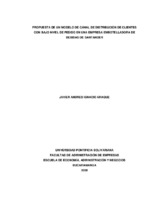| dc.contributor.advisor | Director. Sarmiento Suárez, Jaime Enrique | |
| dc.contributor.author | Araque, Javier Andrés Ignacio | |
| dc.coverage.spatial | Bucaramanga | spa |
| dc.coverage.temporal | 2020 | |
| dc.date.accessioned | 2021-09-27T14:17:06Z | |
| dc.date.available | 2021-09-27T14:17:06Z | |
| dc.date.issued | 2020 | |
| dc.identifier.uri | http://hdl.handle.net/20.500.11912/9283 | |
| dc.description | 99p.: (pdf); il; imágenes; gráficas; tablas. | spa |
| dc.description.abstract | Definir un canal de distribución para una empresa de consumo masivo y que este satisfaga las necesidades de
los clientes en los mejores costos y con los mejores índices de servicio son las expectativas y necesidades del
mercado actual. El presente trabajo contempla uno de los problemas más característicos de este tipo de
compañías, donde se debe definir si es rentable o productivo el llegar a los clientes con bajos niveles de pedido
o si realmente se deben dejar a un lado por los altos costos operativos y dificultades generadas del mismo
proceso. En el desarrollo del presente documento se realizó una revisión literaria de los diferentes diseños que
se presentan en la logística de distribución y los problemas de ruteo de vehículos y decisiones de transporte que
se deben contemplar. De forma inicial se realizó la caracterización de la operación logística de acuerdo a los
niveles de pedido que en forma actual se tenían en la embotelladora de bebidas, analizando de forma posterior
la dinámica de los canales existentes de acuerdo a sus indicadores claves de desempeño, lo que permitió
entender su evolución y tendencia mes a mes en los años 2018 y 2019. Se realizó un análisis comparativo,
identificando las variaciones existentes y oportunidades de mejora del canal bronce, el cual contiene los clientes
con bajo nivel de pedido, reforzando la necesidad de un nuevo canal que permita cambiar los resultados
obtenidos al momento. Finalmente se hace un análisis y diseño de canal de distribución, sin embargo sus
resultados no se alinean con la estrategia y metas de la embotelladora de bebidas, siendo necesario realizar
estudios de tiempos y movimientos, permitiendo calcular de forma posterior el nuevo canal para atender clientes
con bajo nivel de pedido, usando camiones de una capacidad diferente de carga y dimensiones diferentes a los
actuales. | spa |
| dc.description.abstract | Defining a distribution channel for a mass consumption company that meets the needs of customers at the best
costs and with the best service rates are the expectations and needs of the current market. The present work
contemplates one of the most characteristic problems of this type of companies, where it must be defined
whether it is profitable or productive to reach customers with low order levels or if they should really be left aside
due to high operating costs and difficulties generated from the same process. In the development of this
document, a literary review of the different designs presented in distribution logistics and the problems of vehicle
routing and transportation decisions to be considered was carried out. Initially, the characterization of the logistics
operation was carried out according to the levels of order that were currently held at the beverage bottling plant,
subsequently analyzing the dynamics of the existing channels according to their key performance indicators,
which that allowed us to understand its evolution and trend month by month in the years 2018 and 2019. Having
carried out this phase, a comparative analysis was carried out, identifying the existing variations and
opportunities for improvement of the bronze channel, which contains low-order customers, reinforcing the need
for a new channel that allows changing the results obtained at the time. Finally, a first analysis and design of the
distribution channel is made, its results do not align with the strategy and goals of the beverage bottling company,
and it is necessary to carry out time and movement studies, allowing the new channel to be subsequently
calculated to serve customers with a low level of order, using trucks of a different load capacity and dimensions
different from the current ones, attending to the needs of the terrain where this type of customer is concentrated. | eng |
| dc.format.mimetype | application/pdf | |
| dc.language.iso | spa | |
| dc.publisher | Universidad Pontificia Bolivariana | spa |
| dc.rights | Attribution-NonCommercial-NoDerivatives 4.0 International | * |
| dc.rights.uri | http://creativecommons.org/licenses/by-nc-nd/4.0/ | * |
| dc.subject | Maestría en Administración | spa |
| dc.subject | Cadena de distribución | spa |
| dc.subject | Consumidores | spa |
| dc.subject | Empresas - Embotelladoras | spa |
| dc.subject | Santander (Departamento : Colombia) | spa |
| dc.subject | Costos | spa |
| dc.subject | Productividad | spa |
| dc.subject | Cadena de suministros | spa |
| dc.title | Propuesta de un modelo de canal de distribución de clientes con bajo nivel de pedido en una empresa embotelladora de bebidas de Santander | spa |
| dc.type | Tesis de Maestría | spa |
| dc.publisher.department | Escuela de Economía Administración y Negocios | spa |
| dc.publisher.program | Maestría en Administración | spa |
| dc.rights.accessRights | openAccess | spa |
| dc.type.hasVersion | publishedVersion | spa |
| dc.description.sectional | Bucaramanga | spa |
| dc.identifier.instname | instname:Universidad Pontificia Bolivariana | spa |
| dc.identifier.reponame | reponame:Repositorio Institucional de la Universidad Pontificia Bolivariana | spa |
| dc.identifier.repourl | repourl:https://repository.unab.edu.co/ | |
| dc.description.degreename | Maestría en Administración | spa |


